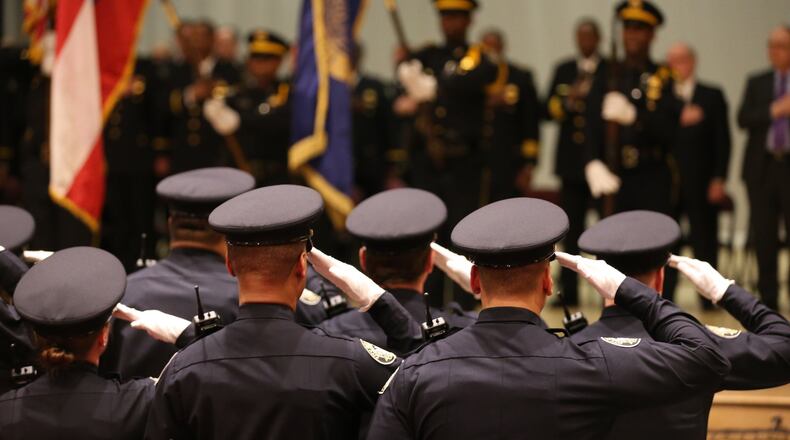It has become an annual problem that’s only getting worse for Atlanta police.
“We’re certainly in a heightened alert headed to a crisis,” said Ken Allen, a retired Atlanta officer still active with the police union.
With 266 openings, APD is about 13 percent shy of its authorized force of 2,039 officers. The department is losing up to 14 officers each month, Allen said.
Atlanta isn't alone. Major cities across the nation are struggling to lure as many officers as they lose — to retirement, career changes and other departments enticing them with higher pay. The Dallas Police Department is down about 600 officers from its peak 10 years ago. New York and Los Angeles are also facing officer shortages. Locally, Gwinnett County police report 50 vacancies and, in a recent interview, Chief Butch Ayers said the department has seen a net loss of officers since 2011.
INTERACTIVE: Crime in Atlanta
MORE: After a deadly 2016, homicides in Atlanta decline
“The hiring problem is by no means an Atlanta issue or a Georgia issue,” Atlanta Police Chief Erika Shields told The Atlanta Journal-Constitution. “We have an issue with our brand. There was a time when it was appealing to be law enforcement. I think it was viewed as respectable. That’s changed dramatically.”
‘A hard product to sell’
The U.S. economy has maintained a brisk pace of growth through the first three quarters of 2017 — good news for most Americans, bad news for law enforcement recruiters.
“In a strong economy it’s very difficult for government agencies to compete for a talent pool that’s going to go for the higher paying job,” said Richard Myers, executive director of the Major Cities Chiefs Association.
In Atlanta, the private sector isn’t the only competition. New municipalities like Brookhaven and Johns Creek offer better pay with less risk, a combination that’s proven attractive to veteran officers from APD, among other departments.
But the money dynamic is nothing new. How the public — and in particular, millennials — view law enforcement has changed. Some of the wounds have been self-inflicted.
“With body cameras, you’re seeing officers engage in everything from really poor decision-making to outright civil rights violations,” Shields said.
And the risks are all too real, Shields said, noting the assassination in 2016 of officers in Baton Rouge, New York and Dallas.
“It’s a hard product to sell,” she said.
(Deaths in the line of duty are actually down 15 percent in 2017 compared to the previous year. Gunfire deaths are down 29 percent, according to the Officer Down Memorial Page.)
Myers said the new generation of recruits needs to be reminded that, while there have been some “egregious incidents,” they pale in comparison to the “millions of interactions” police have with citizens every year.
“The public has a jaded view of policing,” said Myers, a 30-year veteran of law enforcement. “This extreme scrutiny of every interaction, all the second guessing … why would anyone sign up for that?”
“Somehow we’ve got to change this narrative about the nobility of policing,” he said.
The bottom line
Allen agrees there are several factors explaining the shortage of officers.
But in the end, “It comes down to the money,” he said.
Starting pay for APD officer is around $40,000 ($42,800 for cadets with a Bachelor’s degree) comparable to neighboring departments, although that doesn’t kick in for recruits until almost nine months after their hiring date. And salaries top out at $55,000, compared to $66,000 for DeKalb County and $62,000 for Cobb, Allen said. Officers in those departments also get take-home cars; APD does not offer that perk.
Shields said she is trying to get rid of the recruit pay limitations and says APD has to do a better job identifying annual cost of living increases to offset rising health insurance premiums “so I won’t have an employee with 10 years (service) waving a paycheck from 10 years earlier with the same take home.”
“These are fixable,” she said. “I put a lot of it on us, because historically we’ve done a very poor job of developing any kind of business plan. We need to meet with the mayor and say, ‘This is what we see next four years. Can we project it out and build it into the budget?’ We should’ve been doing that and for whatever reason we haven’t been.”
Members of the force are watching the mayoral runoff between Keisha Lance Bottoms and Mary Norwood closely.
The city police union’s relationship with Kasim Reed soured after the mayor and the City Council excluded public safety officers from raises awarded to about 3,000 city employees. Reed acted after the police and fire unions supported a class-action lawsuit challenging his 2011 pension reform.
In the meantime, the struggle to fill APD’s vacancies continues. The department told The AJC it has interviewed 1,530 applicants this year. Of those, 91 have been hired. The city has 1,773 sworn positions filled, which includes 74 recruits.
“There will have to be attention paid to salaries for active employees and those that we’re trying to hire for us to continue to hire and, more importantly, retain the talent,” said Shields, who has overseen a 27 percent decrease in murders in her first year as chief. “It’s a learned profession. You have to get conditioned to the confrontational nature that is law enforcement to become proficient in it. If you look at your most senior employees, they can almost always without question resolve issues through communication. And that takes times to get there.”
Failure to keep those officers in Atlanta is “a loss that’s incalculable,” she said.
About the Author
The Latest
Featured



